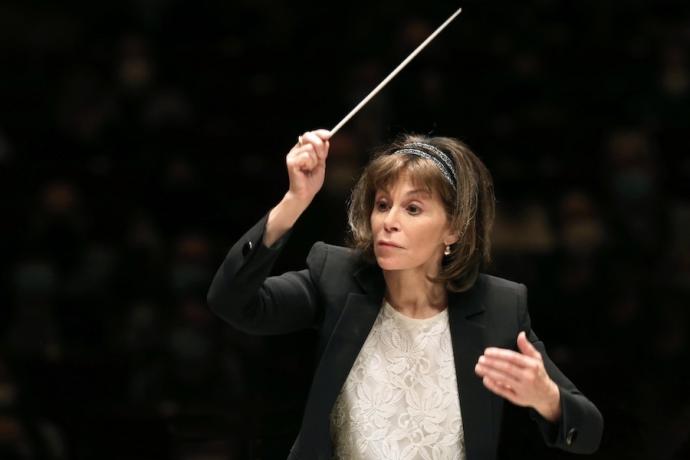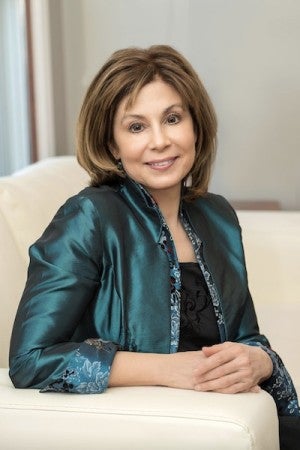First Woman: WYSO Conductor JoAnn Falletta continues to pave the way for women in conducting
Falletta shares about the concert that changed her life, describes what it was like taking classes with Leonard Bernstein, and offers advice for young musicians.

Photo credit: Steve J. Sherman
“I never set out to be a pioneer,” says JoAnn Falletta.
But in the world of conducting, where male musicians frequently win the most prestigious positions, Falletta’s talents and leadership skills have set her apart as a trailblazer.
Falletta—who will be conducting the World Youth Symphony Orchestra’s concert on July 2—wanted to be a conductor ever since she attended a life-changing concert as a young girl. The story of her career is one of overcoming stereotypes and skepticism. It’s also a story of triumph, and of how Falletta channeled inspiration from conducting greats into a style that’s all her own. In doing so, she’s been able to pave the way for the next generation of young conductors.
Learning from conducting greats like Stokowski and Bernstein
Falletta grew up in New York City to music-loving parents who enrolled their daughter in guitar lessons and immersed her in the local concert scene. At age 11, she went to Carnegie Hall with her father to see the American Symphony conducted by Leopold Stokowski.
“They played Beethoven's Sixth,” Falletta remembers. “After the wild applause at the end, Stokowski turned around and said ‘Well, since you liked it so much, we're going to repeat the last movement.’ And I thought it was so wonderful that we could get to hear this magical thing again. I remember saying to my father, ‘That's what I want to do.’ I wanted to be a Maestra. I wanted to be a conductor.”
Falletta continued to chase her passion for music throughout high school. But when she arrived at Mannes School of Music and told her instructors that she wanted to double major in guitar and conducting, she encountered some skepticism.
“They said, ‘It's very rare for a woman to conduct an orchestra now, and we don't want to set you up for a situation where you will be disappointed that it can't happen.’”
Undaunted, Falletta chose to chase her dreams anyway. She audited conducting classes in her first year until her instructors decided she’d proved herself and allowed her to pursue further studies.
She went on to earn master’s and doctorate degrees at The Juilliard School, where she had the opportunity to work with famed conductor, composer, and music educator Leonard Bernstein.
“He was larger than life when he walked into the room at Juilliard,” Falletta remembers. “The air in the room seemed to change—it crackled with energy.”
Working with Bernstein was a vital turning point for Falletta, who says that he helped her “see beyond the minutiae of conducting to the emotion of what we were doing and how we were inspiring the orchestra and, in turn, the audience.”
That sensitivity to emotion is an approach Falletta applies to her conducting today. According to her, it’s important to balance rigorous preparation with a certain amount of openness to whatever happens.
“You have to be ready to go with someone who has now taken the phrase in an even more beautiful direction than they did before, and make allowances for that, because the music is very elastic,” says Falletta. “We plan for performance, but it's never exactly what we planned for.”
I didn't set out to be the first and I didn't set out to prove anything. I really just was so deeply in love with the orchestra and with the idea of being the catalyst to helping them. As a result, I’ve been the first in various places.
Leading at Buffalo and beyond
After graduation, Falletta began to earn leadership opportunities in the music world. When she stepped into the role of Music Director of the Buffalo Philharmonic in 1998, she became the first woman to head up a major American orchestra.
“I didn't set out to be the first and I didn't set out to prove anything,” says Falletta. “I really just was so deeply in love with the orchestra and with the idea of being the catalyst to helping them. As a result, I’ve been the first in various places.”
From 2011-14, she served as Principal Conductor of the Ulster Orchestra—the first woman and the first American to fill this post. In 2018, she was the first American woman conductor to lead an orchestra at the Beethoven Easter Festival in Poland.
Throughout her career, Falletta has been a strong advocate for women in music, and she works hard to pave the way by leading seminars for women conductors for the League of American Orchestras. Young female conductors often come to her with questions on everything from how to choose comfortable concert attire to how to work with all-male boards of directors at orchestras.
“I conduct a lot of works written by women of the past and contemporary women, and I have the chance to interact with a lot of women conductors,” says Falletta.

JoAnn Falletta. Photo credit: Heather Bellini
“The concerts are so joyful”
Falletta, who has a passion for teaching the next generation of young musicians, is looking forward to working with students at Interlochen Arts Camp. Having worked with Interlochen students before, she says her favorite part of the experience is watching the students grow in confidence.
“I see them changing every single rehearsal,” she says. “Their confidence grows, their willingness to take chances grows. And all of a sudden, at some point towards the end of the week, they feel like ‘We have this, we can do this.’ And then the concerts are so joyful.”
By now, Falletta has earned herself a stellar reputation: she was named one of the 50 great conductors of all time by Gramophone Magazine, and she was Performance Today’s first Classical Woman of the Year. But when she gives advice to young musicians today, her words come from a place of profound humility.
“You will always be learning, you will always be on a path, and you're never going to arrive,” she says. “Even for myself, I need to be the kind of person who can make peace with that. I will always be learning, and I'll always get a little closer to what this music means, but I'll never really know it. My job is just to keep studying. To me, that's the best kind of feeling—to keep on going down that path.”
Learn more about Music at Interlochen Arts Camp.
JoAnn Falletta will conduct the World Youth Symphony Orchestra on Sunday, July 2, 2023, at 7:30 p.m. Tickets are available for purchase.